Technical Terrapin
Sound, light, staging and power. The basics.
OK, cards on the table, it's pretty difficult to get all of this into one blog post, but it has to be considered. Whether you're putting on an event in a building, in a marquee or on an outdoor stage, it's very unlikley that you won't need at least a few technical bits. Remember that you can pick the phone up to us at any time if there's an idea you'd like to discuss.
It's very rare that an event won't need any of the things discussed in this section but certain things may be provided by your venue so please check what they can help with first.
It's also very rare that you won't require both sound and light for a stage whether inside a marquee or an outdoor stage. If you have it sourced elsewhere or you're providing it centrally for your entire event, then that's fine. You should make sure, in this case, that your different contractors are communicating with each other or that you have someone in control of the overall production of the stage to tie it all together.
We are always happy to discuss specific requirements with you too, of course.
I'm for the stage, darling!
Whether you're looking at an outdoor stage, a marquee, or both, It's good to know what type of staging exists out there, as with a bit of thought you can often make something very individual happen. Take a bit of time to think about where you want the speeches to happen, the first dance or where the band and DJ should go. You might need to consider the correct height for your sight-lines or crowd barrier for larger audiences.
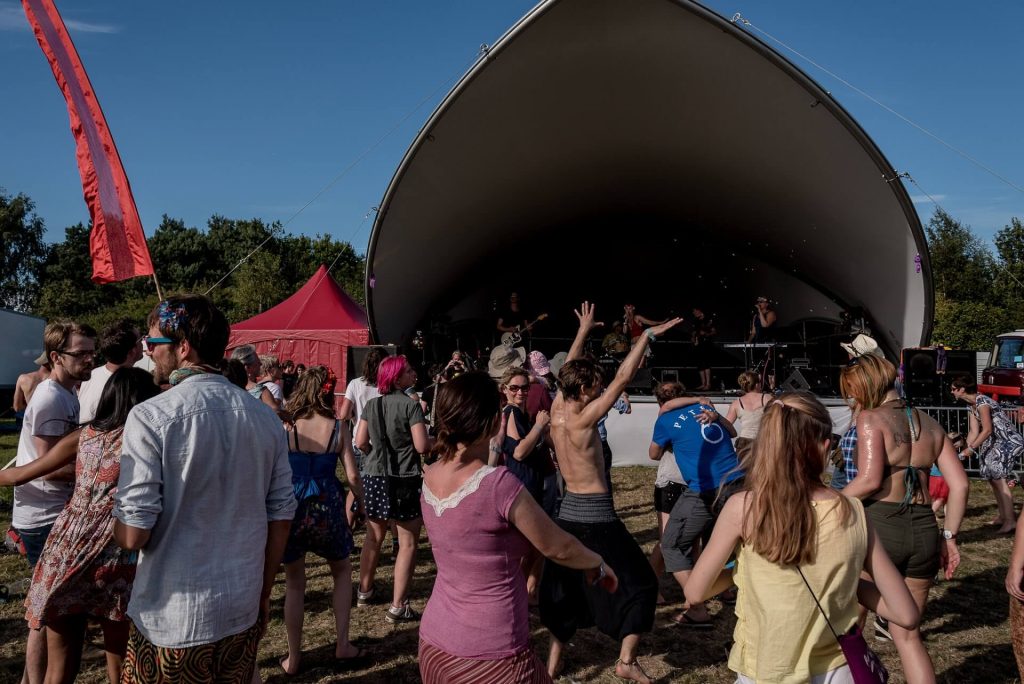
Like marquees, staging is normally modular - meaning that it comes in sections which can simply be put together to the required size thus making it very versatile. Sometimes interesting shapes such as semi-circles can be used for a stage if you're looking at doing a show in the round.
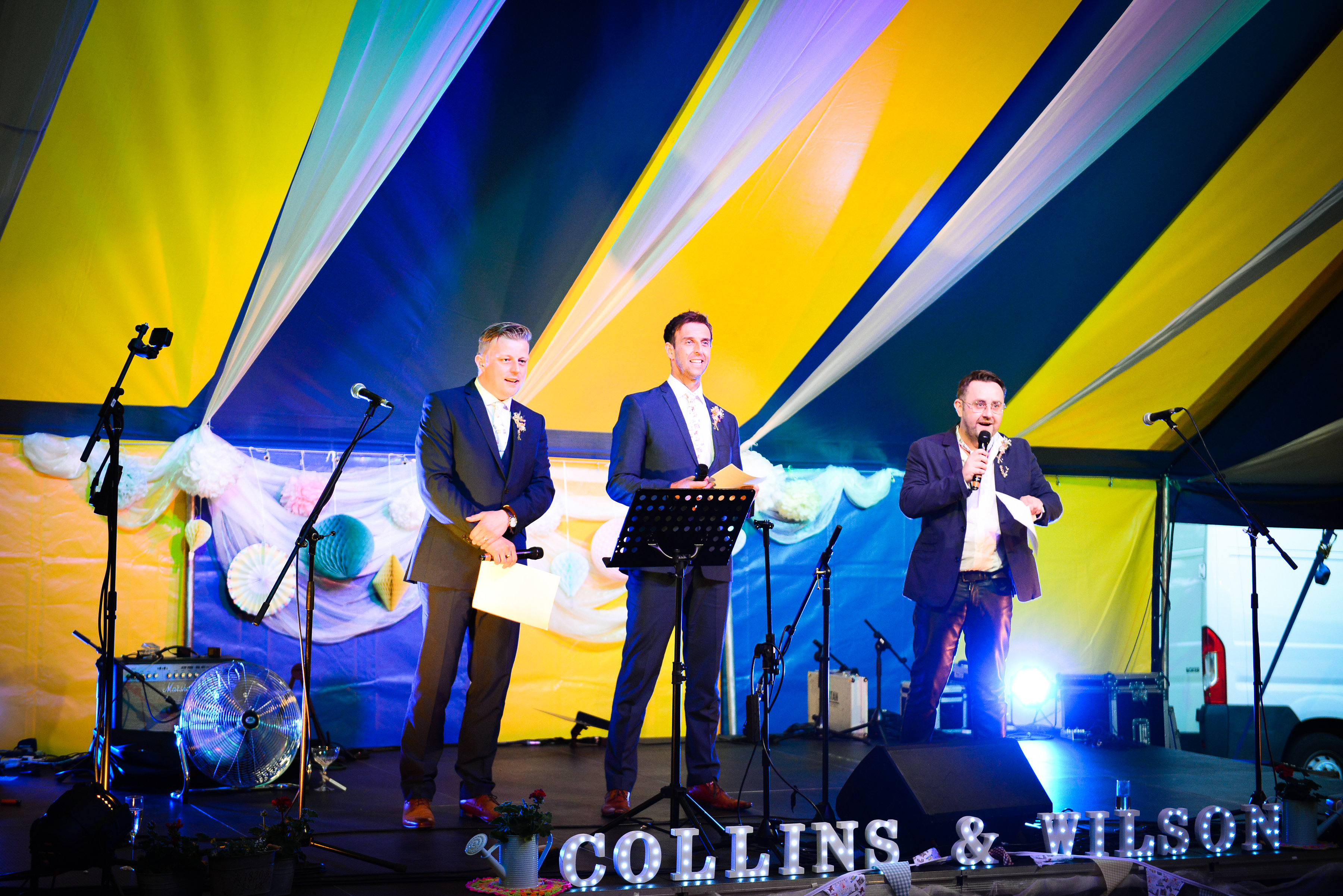
Much like a centrepiece, the stage can be a complete visual focal point. As well as houdig bands and DJs you can lift up the bridal party table during dinner so that you can say hello to everyone, have a projection of visuals on it, or use it to show off a particular highlight of the wedding, such as the cake, circus performers or a classic car which you might have hired for the day.
How DOES the light get in?
Lighting can take many forms and have many uses. You might just require what is known as 'house lighting' (functional lighting designed to keep people from bumping into things when the tent is dark) but more often than not, you will need some form of atmospheric lighting to create the environment you want.
As far as outdoor stages go, you might decide to not have any. It can work. If it's the daytime and all you have is a keynote speaker or an awards show or something of that ilk, it might be bright enough to see what's going on. Generally though, with our stages or someone else's, you're going to need something to pick out the faces of the people up there even in the daytime. More likely is that you're going to end up needing more than that.
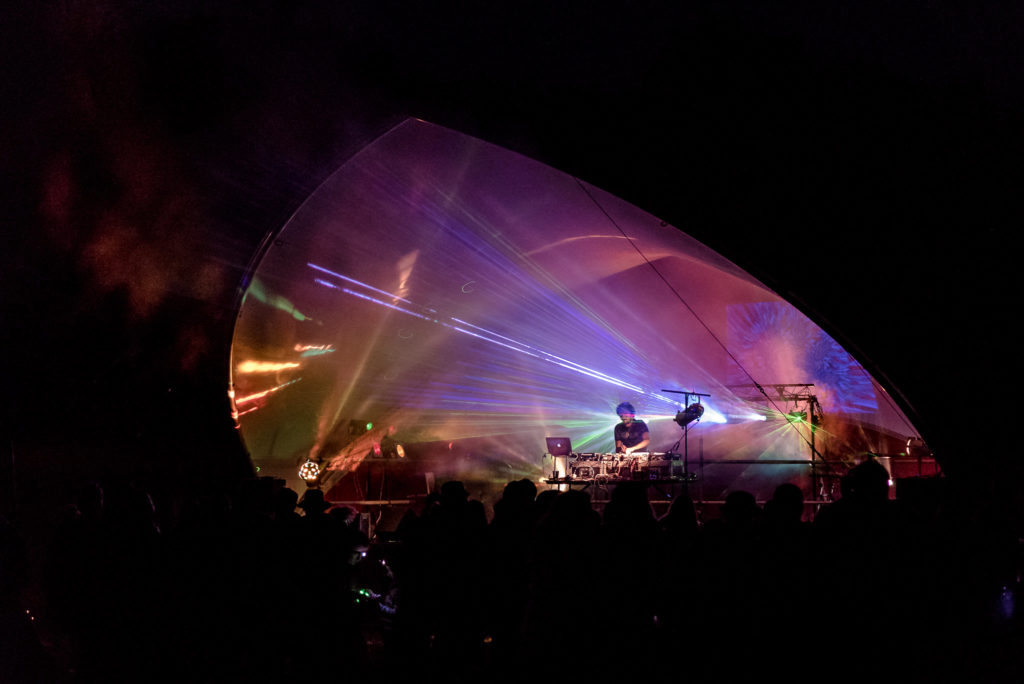
Again, there are basics that work well for all acts to just light them up and there there are various types of flashy things, smoke machines, lasers and kit that will suit some acts more than others.
If you're having a meal, you'll probably want soft and relaxed lighting. Possibilities include - making use of the marquee structure itself to create an ambiance with uplighters or possibly some fairy lights. If fairy lights aren't quite bright enough, you can use Festoon, which is a term for a string of full-sized lightbulbs. It can be hung from trees/buildings or upright scaffold poles. You may also want some festoon lighting outside the structure to show pathways to the bathroom, car park or separate bar.
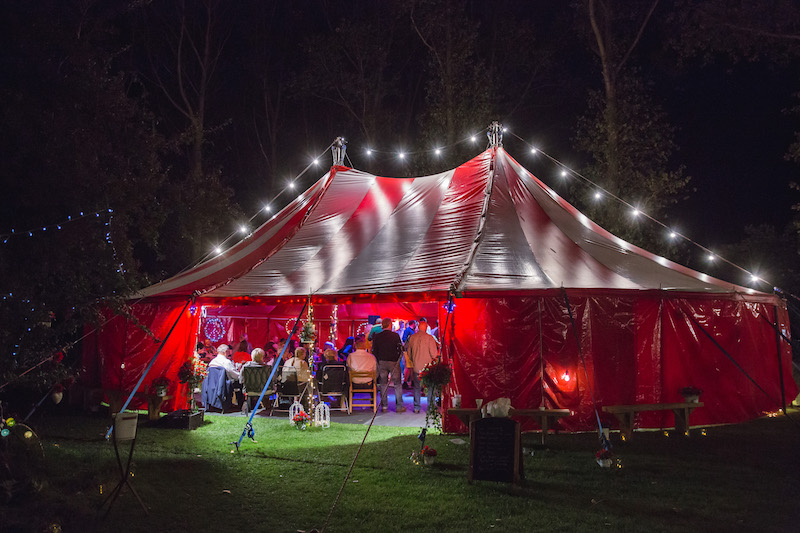
If there will be dancing, you'll want some form of dynamic lighting that changes colour, moves and/or flashes. Dynamic lighting can be automatic or even sound-activated.
You'll want lights pointing at the stage if you have one, to light whoever is on it. The mix of this and the atmospheric lighting is a subtle thing to do properly and it takes skill, so more advanced set-ups will have a lighting designer. Your marquee company can usually supply the basics or recommend someone to do more advanced creations. For now you should consider the type of atmosphere you're trying to create and the different stages the marquee might go through. For example, dinner, going in to dancing will have different set ups.
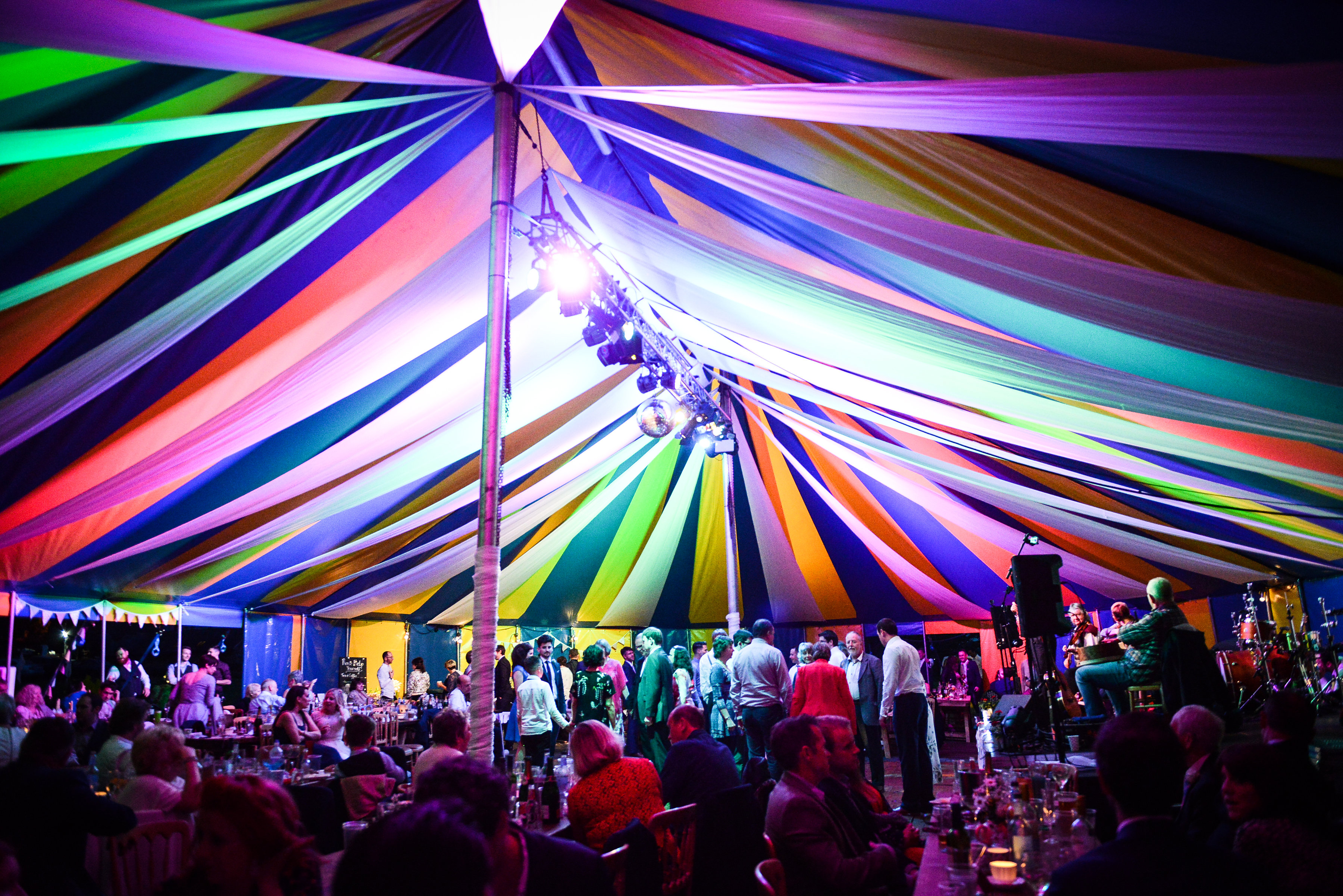
What did you say?
Even for a bit of background music over dinner or a speech, you need a sound system. The sizes vary hugely based on the size of the audience and what's being played through it, but you'd be surprised at how easily an ipod and dock gets lost underneath everyone's chatter. It's worth getting some advice if you're not sure - speakers that sound perfectly loud in your house will be lost in a bigtop and even more so outdoors
Soundsystems come in different types too. Speeches require a small range of frequencies which means they don't have a lot of very high or low tones in them. Music of any form is likely to have a lot more bass meaning you will need a soundsystem that can handle those low frequencies. Generally, you'll find that live music requires a big step-up in sound requirements. Not just a PA system for the band, but on-stage speakers (monitors) for them and microphones for the instruments.
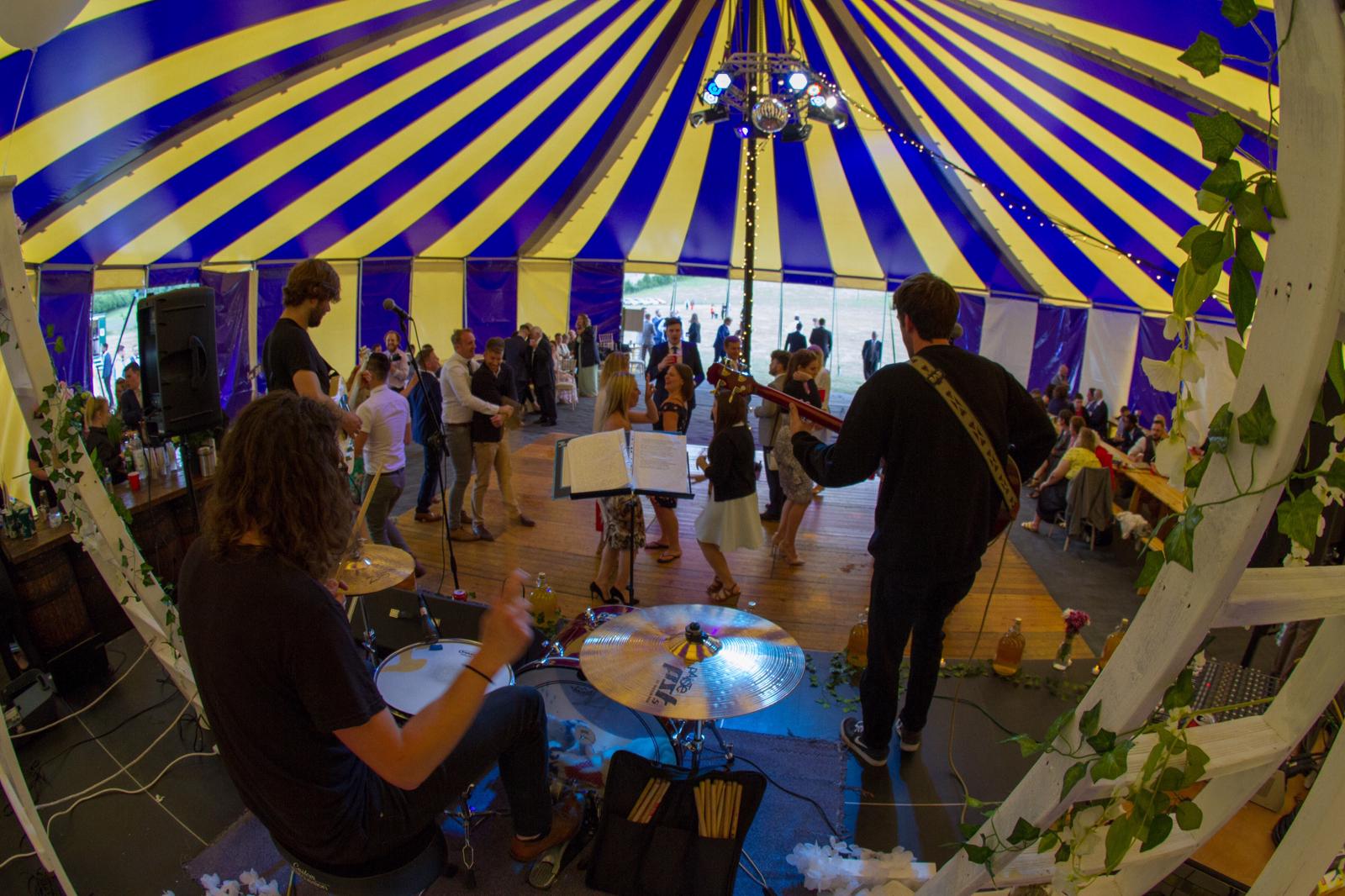
You'll need someone to set this up and make sure it's all checked properly. Quite often a live act will do this themselves but other times you'll need a company to do it for you. As with lights, check that your events company can recommend someone or organise this for you.
The sound on an outdoor (or any) stage is broadly broken up into two parts. The front-of house speakers (known as the PA or Public Address system) and the onstage sound system. Different types of acts require different types of onstage sound but generally speaking, PA systems should be able to cover most types of music.
Feel free to get in touch and we will outline the exact makes and models of the sound equipment we carry to offer alongside our stages and tents. We're pretty confident that because you only have to deal with one company, you can not only save on inter-contractor communication issues but can also keep costs down as you will only need one company to do it all. Handy
Power!
Electronic things need power. If you are able to run cables from a nearby building then all well and good as long as you don't draw so much power that you are going to affect the electrics in the building! Always ensure that your suppliers speak to your venue ahead of time or that someone is in charge of that.
If power supply is limited then you will need one or more generators, which most lighting and sound companies provide as part of their service (so check your booking to see what is included in your quote).
Whether running power from a building or using generators, you will need an idea of how much you will be using - kettles and tea urns for after-dinner cake use a lot, for example. You need to ensure that supply meets demand so if you aren't sure about this ask whoever owns the equipment because it's their responsibility to know, or check out our post helping you to hire a generator. Be mindful of someone over-selling you on generator size but equally be weary of caterers who tell you they only need a small one (unless they're cooking off gas, of course).
People who run events work with this sort of information all the time so seek advice from someone who knows, not someone who is guessing. The best question to ask anyone who is bringing electrical equipment is, "how many plugs do you need to run your service?" (particularly useful for sounds & lighting providers) or ask them to list all of their electrical appliance (mainly caterers). There are also regular changes in the outdoor industry as suppliers start to consider their environmental impact so it's worth staying up to date or checking in with people who are.
All you need to know is the basics, which is why we're here to help. Have you now got an idea about:
- Whether there will be a stage, and how big or what shape it will be?
- What kind of lighting is required?
- What type of sound-system is needed?
- How all of these will be powered?
If this has left you with more questions than answers (which is totally understandable) then get in touch and let us take some of the stress away.
